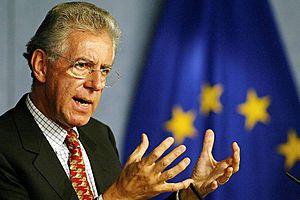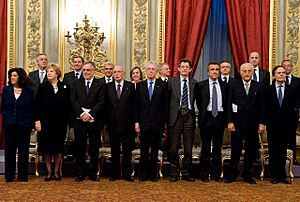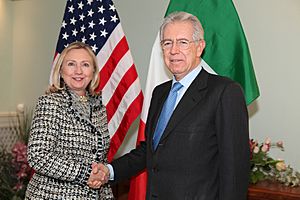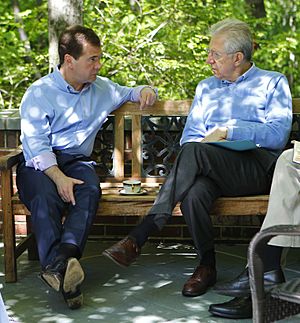Mario Monti facts for kids
Quick facts for kids
Senator for life
Mario Monti
|
|
|---|---|
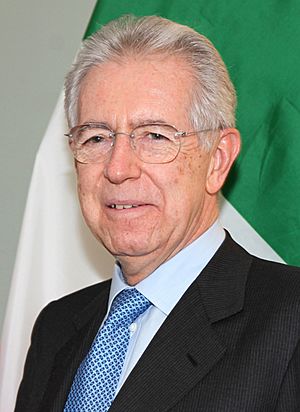
Monti in 2012
|
|
| Prime Minister of Italy | |
| In office 16 November 2011 – 28 April 2013 |
|
| President | Giorgio Napolitano |
| Preceded by | Silvio Berlusconi |
| Succeeded by | Enrico Letta |
| Minister of Economy and Finance | |
| In office 16 November 2011 – 11 July 2012 |
|
| Prime Minister | Himself |
| Preceded by | Giulio Tremonti |
| Succeeded by | Vittorio Grilli |
| European Commissioner for Competition | |
| In office 15 September 1999 – 30 October 2004 |
|
| President | Romano Prodi |
| Preceded by | Karel Van Miert |
| Succeeded by | Neelie Kroes |
| European Commissioner for Internal Market, Services, Customs and Taxation | |
| In office 18 January 1995 – 15 September 1999 |
|
| President | Jacques Santer |
| Preceded by | Raniero Vanni d'Archirafi |
| Succeeded by | Frits Bolkestein |
| President of Bocconi University | |
| In office 6 September 1994 – 1 November 2022 |
|
| Preceded by | Giovanni Spadolini |
| Succeeded by | Andrea Sironi |
| Member of the Senate of the Republic | |
| Life tenure 9 November 2011 |
|
| Appointed by | Giorgio Napolitano |
| Personal details | |
| Born | 19 March 1943 Varese, Lombardy, Kingdom of Italy |
| Political party | Independent (1995–2013; since 2015) Civic Choice (2013–2015) |
| Spouse |
Elsa Antonioli
(m. 1970) |
| Children | 2 |
| Alma mater | Bocconi University Yale University |
| Signature | |
Mario Monti (born 19 March 1943) is an Italian politician, economist, and professor. He was the Prime Minister of Italy from 2011 to 2013. During this time, he led a special kind of government called a technocratic government. This happened when Italy was facing a big economic problem, known as the Italian debt crisis.
Before becoming Prime Minister, Monti worked as a European Commissioner from 1995 to 2004. He was in charge of important areas like the Internal Market and Competition for the European Union. He also served as the head of Bocconi University in Milan for many years.
In November 2011, Italy's President, Giorgio Napolitano, asked Monti to form a new government. This was because the previous Prime Minister had resigned during the economic crisis. Monti became Prime Minister and also took on the role of Minister of Economy and Finances for a while. He was also made a Lifetime Senator just before becoming Prime Minister.
From May to October 2013, Monti was the leader of a political party called Civic Choice.
Contents
Early Life and Education
Mario Monti was born in Varese, Italy, on 19 March 1943. His family had roots in both Italy and Argentina. His father was born in Argentina, where Mario's grandfather had moved from Italy in the 1800s.
Monti went to a private high school and then studied economics at Bocconi University in Milan. He graduated in 1965. Later, he received a scholarship to study at Yale University in the United States. There, he learned from James Tobin, a famous economist who won the Nobel Prize in Economics.
Academic Career
Monti started his career as a professor at the University of Trento. He then taught economics at the University of Turin from 1970 to 1985. After that, he moved to Bocconi University, where he became the Rector (a top leader) in 1989 and President in 1994.
His research in economics helped create something called the "Klein-Monti model." This model helps explain how banks behave when they are the only ones offering certain services.
European Commissioner Role
A European Commissioner is like a minister for the whole European Union. They are in charge of specific areas that affect all member countries.
Working for the European Union
In 1994, Mario Monti was chosen to be a European Commissioner by the Italian Prime Minister at the time, Silvio Berlusconi. From 1994 to 1999, Monti was responsible for areas like the internal market, financial services, and taxes across Europe. His hard work earned him the nickname "Super Mario" from his colleagues and the media.
In 1999, he was re-appointed as a Commissioner and given an even more important job: being in charge of Competition. This meant he made sure that companies competed fairly and that no single company became too powerful.
As the Competition Commissioner, Monti looked into many big company mergers. These included deals between large companies like General Electric and Honeywell. He also made a very large fine against Microsoft in 2004 for using its strong position in the market unfairly.
Some people criticized Monti for being too strict with company mergers. However, his supporters believed he was doing important work to develop fair competition rules in the EU. He also introduced reforms to make the merger review process more open and clear for companies.
In 2004, when his second term ended, the Italian Prime Minister decided not to re-appoint him to the Commission.
Later Work for the EU
In 2010, the President of the European Commission, Manuel Barroso, asked Monti to write a report. This report was about how to improve the EU's Single Market, which allows goods, services, money, and people to move freely between member countries. His report, published in 2011, suggested 12 ways to boost the European economy.
Prime Minister of Italy
Becoming Prime Minister
On 9 November 2011, Italy's President, Giorgio Napolitano, made Monti a lifetime senator. This is a special honor given to people who have achieved great things for the country. Just a few days later, on 12 November 2011, after Prime Minister Silvio Berlusconi resigned, President Napolitano asked Monti to form a new government.
Monti agreed and met with leaders of Italy's main political parties. He wanted to create a government that would focus on fixing the country's economic problems. On 16 November 2011, Monti officially became the Prime Minister of Italy. His government was made up of experts and professionals, not elected politicians. He also decided to be the Minister of Economy and Finances himself at first.
Both parts of the Italian Parliament, the Italian Senate and the Italian Chamber of Deputies, supported Monti's new government. Only one political party voted against it.
Economic Changes
On 4 December 2011, Monti's government introduced emergency measures to help Italy's economy. These steps were meant to calm financial markets and stop Italy's debt problems from getting worse. The plan included increasing taxes, changing pension rules, and fighting tax evasion. Monti even announced that he would give up his own salary as part of these reforms.
The Italian Parliament approved these measures quickly. This showed strong support for his government's efforts to stabilize the economy.
Job Market Reforms
In January 2012, Monti's government also introduced changes to Italy's job market rules. The goal was to make it easier for people to start certain jobs, like taxi drivers or lawyers, by changing their licensing systems. They also wanted to make it simpler for companies to hire and let go of employees. This was hoped to encourage businesses to create more permanent jobs.
These changes faced some opposition from labor unions and led to public protests. However, the government worked with unions to find a compromise.
2013 Election
On 21 December 2012, Monti announced he would resign as prime minister after the 2013 Budget was passed. He initially said he would only stay until an early election. However, he later decided to run in the election himself, leading a group of political parties called the Civic Choice.
The election took place on 24 February 2013. Monti's group came in fourth place. He remained prime minister until a new government was formed on 28 April, led by Enrico Letta.
Political Career After Prime Minister
Lifetime Senator Role
As a Lifetime Senator, Monti continued to be a member of the Italian Senate. He was part of the Commission for Industry, Commerce, and Tourism. In March 2013, he joined the Civic Choice political group in the Senate. He also became a member of the Commission for Foreign Affairs and Emigration.
Leading Civic Choice
On 4 January 2013, Monti launched Civic Choice as a political group to support his ideas in future governments. This group joined with other parties to form a larger coalition for the 2013 general election. After the election, Civic Choice became a political party, and Monti was elected its president in May 2013.
However, he resigned from this role in October 2013. He had disagreements with some senators in his party about how to support the government and the future direction of Civic Choice.
Other Activities
Mario Monti is involved in several important groups called "think tanks." These are organizations that do research and offer ideas on public policy. He was the first chairman of Bruegel, a European think tank.
He has also been an advisor to large companies like Goldman Sachs and The Coca-Cola Company. In 2010, he became the President of the Trilateral Commission, a group that promotes cooperation between North America, Europe, and Asia.
Monti was also a founding member of the Spinelli Group. This organization started in 2010 to help bring the countries of the European Union closer together.
In 2014, Monti became the Chairman of a group for the European Union that looked for new ways to fund the EU's budget. More recently, in 2020, the World Health Organization asked him to lead a commission. This commission's job was to suggest ways to make health and social care systems stronger and more prepared for future challenges.
His other activities include:
- Center for Economic and Policy Research (CEPR), Distinguished Fellow (since 2019)
- Centre for European Reform (CER), Member of the Advisory Board
- European Investment Bank (EIB), Member of the Appointment Advisory Committee
- Friends of Europe, Member of the Praesidium
- Moody's, Member of the Senior European Advisory Council
- Atlantic Council, Member of the Business and Economics Advisors Group
- Transparency International, Chairman of the European Advisory Board (since 2015)
Personal Life
Since 1970, Mario Monti has been married to Elsa Antonioli. She is a volunteer for the Italian Red Cross. They have two children, Federica and Giovanni.
Monti is known for being a private person. He has said that he spent his youth studying hard. For fun, he enjoyed cycling and listening to foreign radio stations to keep up with world news. Besides Italian, he also speaks English.
Awards and Honors
Italian Honors
 Knight Grand Cross of the Order of Merit of the Italian Republic (29 November 2004)
Knight Grand Cross of the Order of Merit of the Italian Republic (29 November 2004) Commander of the Order of Merit of the Italian Republic (27 December 1992)
Commander of the Order of Merit of the Italian Republic (27 December 1992)
Foreign Honors
 Grand Cordon of the Order of the Rising Sun from Japan (3 November 2015)
Grand Cordon of the Order of the Rising Sun from Japan (3 November 2015)
See also
 In Spanish: Mario Monti para niños
In Spanish: Mario Monti para niños
- List of prime ministers of Italy
- Monti Cabinet
- Monti's Agenda for Italy
 | Percy Lavon Julian |
 | Katherine Johnson |
 | George Washington Carver |
 | Annie Easley |


